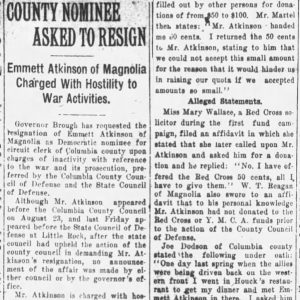calsfoundation@cals.org
Willie Emmett Atkinson (1874–1962)
W. Emmett Atkinson was a farmer and teacher working in Arkansas in the later part of the nineteenth and first half of the twentieth century. An active Democrat and local office holder, he became embroiled in controversy concerning his support for the American effort in World War I.
Willie Emmett Atkinson was born on February 4, 1874, to Robert Atkinson and Eliza Ramsey Gordon Atkinson on the family’s farm near McNeil (Columbia County). He grew up in the Harrison Township of Columbia County; his father had been heavily involved with the development of the township.
Atkinson taught school in Columbia, Lafayette, and Nevada counties from 1897 to 1916. Atkinson was often the only teacher in a school that might enroll from thirty-five to eighty students spread across the twelve grades. It was a challenging occupation, and he was well respected for his work.
Along with teaching, Atkinson was actively involved in the politics of the time. A member of the Democratic Party in Columbia County, he often served as a delegate to the state party convention. In 1912, he ran for the Democratic nomination for the position of Columbia County clerk. He finished second in a seven-man field, but four years later, he defeated the incumbent. Atkinson served from 1916 until he resigned in 1918, and then reclaimed the office in 1923, serving until 1926. At the end of that term, he became a Columbia County judge, a post he held from 1927 until 1933.
As the United States became involved in World War I, Atkinson was an active supporter of the effort, purchasing war bonds and war saving stamps. In 1917, Atkinson was asked for a contribution by the local Red Cross, but when he offered fifty cents, the proposed donation was rejected as too little. Atkinson was insulted by the organization’s response, and he shared the story with friends.
In 1917, the federal government created a new agency, the Council of National Defense. The agency had state and county affiliates whose responsibilities included pursuit of “disloyal” people. After the council designated both the Red Cross and the Young Men’s Christian Association (YMCA) as “war agencies,” they began to label those who refused to donate or who criticized their efforts as disloyal.
In the summer of 1918, representatives of the Columbia County Council of Defense came to Atkinson seeking a $100 donation to the Red Cross and the YMCA. When he protested, saying he could not quickly raise that much money, the council passed a resolution declaring that he had “deliberately taken a stand against his people, his government, and the cause of human freedom.” Calls from as high as the governor’s office went out demanding his resignation both from his position as circuit clerk and as the Democratic nominee for the office in the upcoming election. While he soon secured the money for the required donations, council members dismissed the effort, asserting that he was simply trying to cover up his disloyalty.
Efforts to defend himself and his reputation fell on deaf ears. He made a personal appearance before the council detailing his efforts in support of the war, but the council not only rebuffed Atkinson’s effort but took out a full-page advertisement in the local Columbia Banner, featuring numerous anonymous statements claiming that Atkinson supported a German victory, while also misrepresenting his appearance before the council. The advertisement also stated that anyone criticizing the council’s actions was committing an act of disloyalty. Atkinson realized that he had no recourse and resigned, entering a local hospital to seek treatment for his declining health.
However, in a final act of defiance, he criticized the council and promised that once his health was restored he would again seek office. In 1920, he ran again for circuit clerk. Despite opposition advertisements by the council, Atkinson came up only eighty-three votes short of winning the election. Two years later, he won election to the post and was reelected circuit clerk in 1924. In 1926, and then again in 1928 and 1930, he was elected to the post of Columbia County judge.
After being defeated for reelection in 1932, he retired to his farm. Atkinson, who never married, died on September 30, 1962, and is buried next to his sister Eva in the Shiloh Cemetery in Lamartine (Columbia County).
For additional information:
“County Nominee Asked to Resign.” Arkansas Gazette, September 16, 1918, p. 5.
Williams, Nancy A., ed. Arkansas Biography: A Collection of Notable Lives. Fayetteville: University of Arkansas Press, 2000.
William H. Pruden III
Ravenscroft School







Comments
No comments on this entry yet.